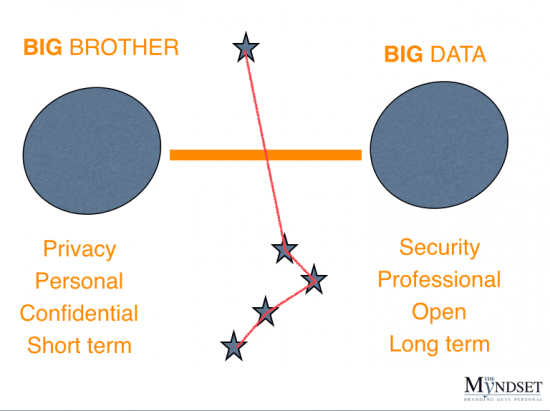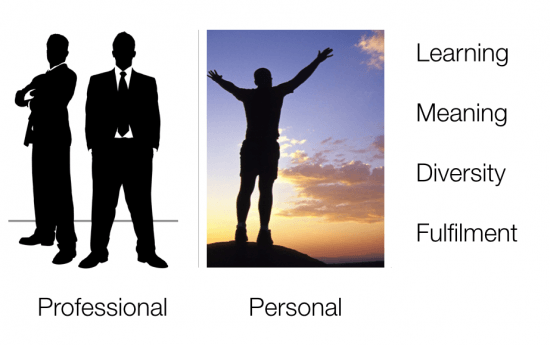The personal mindset sets the tone
It should be no surprise, but the way we view life personally is important in business. I believe, however, that we are now entering a phase where the boundary between personal and professional is withering away. With the flattening — if not inversion — of the pyramid of power, consumers are able to talk about and to brands with a new fervor. The way consumers evaluate brands and their communications is through personal prisms. Thus, to garner engagement, consumers react best to personal reponses. Companies need to find ways to become more personable themselves, to take off the institutional cloak. This is, at its core, why I like to say that branding needs to get more personal. And, as executives, our own personal values and mindset definitely have a role to play in the way we construct our marketing plans.
The mobile is deeply personal
For more and more people, studies show that a smartphone is their most important, holistic and intimate possession. As a result, the way brands communicate with and within a person’s smartphone (be it via email, SMS or social…) must be done with due care not to overstep one’s welcome. Mistrust of marketers and of their over-hyped messaging has long been an issue. If intrusive ads on television felt like an invasion of the living room, incursions in social media streams on one’s smartphone (SMS, etc.) are an even greater personal invasion. With some 25% of Americans now surfing the internet “mobile only”* (with even higher percentages in other countries where smartphone penetration is higher), the insertion of branded messages into social media means that the message are showing up in the small real estate that is available on a smartphone screen. This is hallowed ground.
Polarizing issues
Having empathy and understanding the customer’s viewpoint has always been important. However, with the switch off, sign out, unlike and unsubscribe buttons being so much easier, marketers must get wiser. They must get more attuned to the consumer’s mindset and the context they are receiving your story or message in order to garner the trust. With that trust will come sharing, buying and long-term fidelity. The isssue in today’s fast changing world is that there are a number of relatively new polarizing issues out there. Where you sit on the spectrum between each is important. There is not necessarily a right or wrong as that depends on your personal values and experience, as well as your context and the industry in which you are working. Moreover, there is no correlation between the items in each column. Security and confidential might seem more related, for example, but the opposite ends of the different continuums below are not correlated.
Big Brother versus Big Data
Of all the polarizing issues, none is more central to business and people than the topic of data. Data is the currency behind all social media. The Internet is data. We are all reduced to data points, lodged in governmental and business databases. And, someone is controlling the data: how it is input, who has access and how it is used. As individuals, we cannot be neutral about by whom and how that data is managed. As company executives, we have other prerogatives that aren’t necassarily an the individual customer’s best interests and which may even go against one’s own personal values. Mark Zuckerberg has said that the age of privacy is over. Eric Schmidt once said, “Google policy is to get right up to the creepy line and not cross it,” One’s definition of “creepy” will have a deep impact on strategy and how data is used.
Privacy versus security (as in safety)
There are two dimensions to the security issue. First, there is the notion of people’s safety and security. From airlines and flight attendants whose primary role is to ensure our ‘safety’ (ahead of our comfort) to governments that are mandated to ensure our security, data on individuals is of capital importance. Moreover, the recent Malaysian Airlines incident puts special significance on the need for personal data. To what extent are people willing to forego their privacy and personal information to help with ensuring security. This is fast becoming a politicized issue. This privacy-security continuum invokes the hyper-sensitive issues that Edward Snowden raised with the NSA, and along with Assange and Greenwald’s interviews, was heavily featured at this year’s SXSW conference.
Privacy AND security (as in hacker free)
On another level, it is true that there is a heightened degree of urgency about ensuring the security of confidential information and personal data. On the heels of the massive hacking attacks that have plagued some of the big name companies (Target, Nieman Marcus, Korea Credit Bureau and more), security has become a big deal in corporate board rooms around the world. Privacy invasion is, at least in part, a reason for the mistrust between consumers and companies (read: marketers). In this regard, companies need to make sure that they respect people’s privacy by guaranteeing maximum security of their data. Target is paying the price of that fallability. Even email addresses and mobile numbers are personal and need to be treated with respect, much less credit card and social security numbers.
Personal versus Professional
There is a school of thought that says that once at work, one should conduct oneself in a purely professional manner. On the other hand, consumers tend to expect personalized service. The challenge is providing accurate and timely service all the while being real and individualized. Finding the equilibrium that allows for customized, engaging service and comunications is a strategic consideration, especially when looking at people on the front line; i.e. social media, customer service or in-store sales.
Confidential versus Open
There is no doubt that every business has confidential material. Whether it regards intellectual property, upcoming commercial activities or research & development, companies are justified in keeping under wrap and key certain information. On the other hand, there is a lot of information that is kept under guard despite it having no material interest for others. Under the pretense of wanting to keep things secret, the net is cast over all information. As a result, the spirit of sharing, collaboration and openness is deeply compromised. The challenge for organizations is to strategically carve out the truly confidential information and to make every effort to keep such guarded. The remainder should be given a freer roam. By being more specific on what is secret, there tends to be an improvement in the spirit of sharing and collaboration within and without the organization.
Short term versus long term
There is a never ending battle between short-term results and long-term strategy. On the one hand, long-term customer fidelity is the true gold mine. Yet, as a start-up or just to drive short-term results, companies must find ways to attract (if not acquire) new customers. The issue is being resolute enough to take care of the long-term customers and rely on the slower but more powerful word of mouth of satisfied customers.
In evaluating one’s marketing strategy today, it is important to understand where one sits personally regarding these polarizing issues. It is equally important to find cohesion and congruency with one’s brand values and throughout the organization. Otherwise, too many errors will be made and inconsistencies and breeches will break down equity and trust. In the end of the day, that’s bad for business and shareholder value.
Your thoughts and reactions are welcome.















